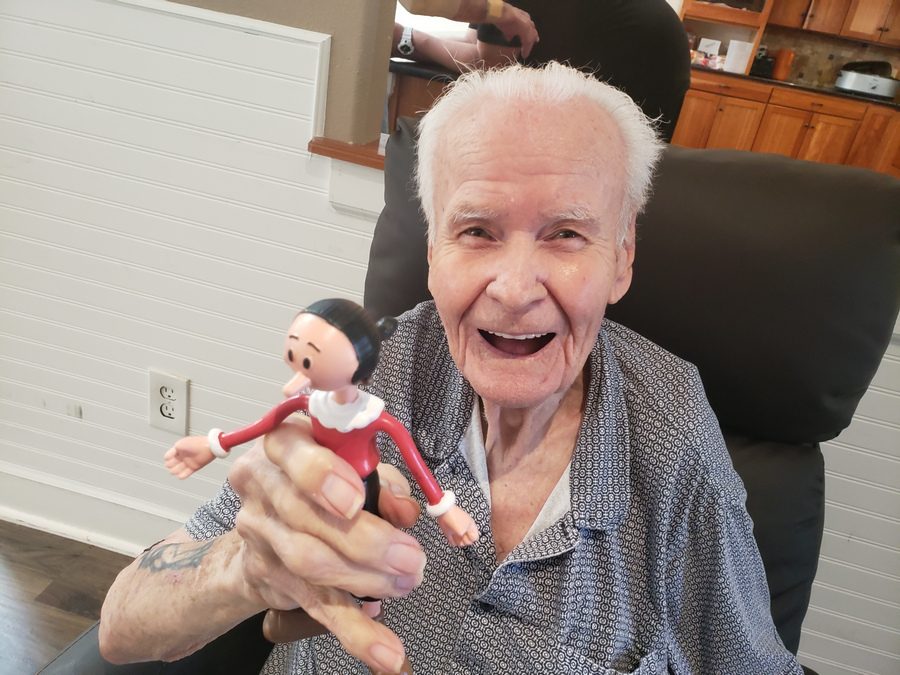Boutique Memory Care Facilities Designed for Tranquility and Respect
Boutique Memory Care Facilities Designed for Tranquility and Respect
Blog Article
All About Memory Care Services: Why Small Memory Care Houses Are an Excellent Option
Memory care services play an important function in supporting individuals with Alzheimer's and dementia. Tiny memory care homes stand apart for their customized method and intimate setting. With reduced staff-to-resident ratios, these homes cultivate stronger links and customized treatment. Homeowners take advantage of enhanced social communications and a risk-free environment. As families discover choices, understanding the distinct advantages of tiny memory treatment homes ends up being important. What factors should be taken into consideration when selecting the right home?
Comprehending Memory Treatment Services
While many might recognize with basic senior treatment alternatives, comprehending memory treatment services is crucial for family members encountering the challenges of cognitive decrease. Memory care specifically accommodates people with problems such as Alzheimer's condition and various other kinds of dementia. These services provide a structured setting that concentrates on improving the lifestyle for locals via specialized care and support.Memory treatment facilities are designed to guarantee safety and security and protection, often featuring secured environments to avoid roaming. Trained team participants are offered around the clock to aid with everyday tasks, drug monitoring, and personal care. Furthermore, memory treatment programs usually consist of cognitive excitement activities, customized to involve homeowners and advertise psychological wellness. Family members can benefit from recognizing these solutions, as they allow informed decisions regarding their liked ones' treatment, making sure that their certain demands and choices are dealt with in a compassionate and encouraging fashion.
The Benefits of Little Memory Treatment Houses
Small memory care homes provide distinctive benefits that can greatly boost the top quality of life for homeowners with cognitive impairments. One substantial advantage is the intimate setting, which permits for individualized communications among personnel and residents. This smaller sized setup fosters significant connections, lowering feelings of isolation and stress and anxiety often experienced by people with memory issues.Additionally, the reduced staff-to-resident proportion in little memory care homes allows caregivers to provide more attentive supervision and assistance. This technique not only improves safety yet also advertises a feeling of safety for the residents.Moreover, small memory treatment homes can adapt promptly to the distinct requirements and choices of each citizen, permitting a much more homelike atmosphere. Such a setting can motivate social interaction and participation in activities, inevitably enriching the day-to-day experiences of those coping with cognitive impairments.
Personalized Care Program for Citizens
Individualized care plans are crucial in memory treatment homes, as they satisfy the unique requirements and preferences of each homeowner. These strategies start with detailed analyses performed by skilled experts, who assess cognitive abilities, case history, and individual passions. This tailored approach warranties that care is not just reliable yet also considerate of each person's self-respect and autonomy.Moreover, personalized care plans are flexible, enabling changes as homeowners' needs develop in time. This adaptability promotes a complacency and knowledge, which is essential for individuals dealing with memory obstacles. Caregivers are educated to implement these strategies regularly, offering assistance that aligns with the locals' routines and preferences.Ultimately, personalized care strategies boost the lifestyle for locals by promoting self-reliance, involvement, and health, making them an essential aspect of memory care solutions in little memory care homes.
Creating a Home-Like Setting
Developing a home-like setting is critical for fostering comfort and experience in memory treatment settings, as it significantly influences locals' emotional health. Tiny memory treatment homes commonly prioritize personalized touches, such as warm color combinations, household pictures, and acquainted furnishings plans, which aid homeowners really feel a lot more at simplicity. Including elements similar to a typical home, like comfy home and public areas, encourages a feeling of belonging.Moreover, utilizing all-natural light and outdoor areas can improve the ambience, promoting leisure and serenity. Personnel play a substantial role in keeping this atmosphere by engaging with homeowners in a thoughtful fashion, treating them like family members. Routine tasks, such as food preparation or gardening, can also add to a home-like feel, using possibilities for residents to get involved in purposeful experiences. Generally, creating a nurturing atmosphere supports cognitive function and psychological security, making it an essential aspect of memory treatment services.
Improved Social Interaction and Community
Enhanced social interaction and area are crucial components of memory treatment solutions. By promoting individualized social involvement and creating a family-like atmosphere, these services promote purposeful links among homeowners. Team events and tasks additionally motivate involvement, assisting people really feel a lot more included and sustained.
Individualized Social Interaction
While social interaction is crucial for total wellness, many individuals with memory problems frequently struggle to involve meaningfully with others. Individualized social interaction in memory treatment homes addresses this challenge by developing customized activities that accommodate citizens' distinct passions and capacities. By focusing on individual preferences, caretakers can promote connections that reverberate deeply with each individual. Activities such as art therapy, music sessions, and directed discussions promote cognitive excitement and emotional expression. Additionally, little team setups motivate camaraderie and allow for even more intimate communications, enhancing sensations of belonging. This strategy not just combats sensations of isolation but additionally empowers homeowners to preserve a sense of identity, ultimately adding to improved psychological health and lifestyle.
Family-like Environment
In a memory care setting, cultivating a family-like environment considerably boosts social communication and builds a feeling of neighborhood among residents. Smaller sized memory treatment homes typically focus on intimate settings, allowing locals to create next page closer links with each other and team participants. This nurturing ambience promotes depend on, which is essential for people with memory disabilities. Locals are more probable to engage in discussions and share experiences, producing a helpful network that reduces sensations of loneliness. The experience of shared rooms and regimens adds to a feeling of belonging, even more motivating social interaction (personalized memory care). In such setups, psychological bonds flourish, bring about improved general well-being and a better of life for residents as they navigate their daily experiences with each other
Group Activities and Occasions

Safety And Security and Protection Attributes in Tiny Houses
Numerous small homes made for memory care include necessary safety and safety features to guarantee the well-being of homeowners. These homes typically use protected entrance and leave points to avoid straying, a common concern among individuals with memory impairments. Furthermore, surveillance systems and alarm system devices boost surveillance, making certain that staff can quickly react to any type of uncommon activities.Interior formats are tailored for safety and security, with minimized risks such as clutter-free paths and sharp edges. Handrails and non-slip floor covering are generally set up to minimize the danger of drops. Personnel are learnt emergency protocols, ensuring they are gotten ready for different situations.Moreover, individualized care strategies may include evaluation of private security needs, giving tailored options for each citizen. Overall, these safety and security and protection functions develop a nurturing environment where locals can prosper while keeping their dignity and freedom.
Exactly how to Choose the Right Memory Care Home
Just how can households ensure they pick one of the most suitable memory treatment home for their enjoyed click this link ones? The decision requires careful factor to consider of numerous aspects. First, families should assess the facility's staff credentials and training, guaranteeing that caretakers are experienced in managing memory-related conditions. Next off, it's essential to analyze the home's atmosphere, concentrating on security attributes and whether it fosters a feeling of community and belonging. Going to the center can supply insight right into day-to-day tasks and the social ambience, which are necessary for mental stimulation and emotional health. Additionally, family members ought to ask about the treatment plans offered, ensuring they are tailored to private demands. Lastly, thinking about the home's place and access for family members visits can add to a smoother change. By attending to these aspects, families can make an informed decision that prioritizes their enjoyed one's convenience and lifestyle in a memory care setup.
Often Asked Concerns
What Credentials Should Team Members in Memory Treatment Residences Have?
Staff participants in memory care homes ought to have relevant certifications, experience in mental deterioration treatment, solid interaction skills, and concern. Ongoing training in behavioral management and restorative interventions improves their capacity to support homeowners properly.
Exactly How Do Memory Care Provider Differ From Traditional Assisted Living?
Memory treatment solutions focus especially on people with memory disabilities, giving specialized assistance and organized atmospheres. In comparison, typical assisted living supplies general support with day-to-day tasks, doing not have the customized technique needed for those with cognitive difficulties.
What Kinds of Activities Are Offered in Memory Treatment Homes?
Memory care homes commonly use a variety of activities created to engage citizens. Typical choices include art therapy, music sessions, cognitive games, workouts, gardening, and social occasions, all focused on improving health and cognitive feature.
Can Homeowners Bring Their Own Personal Belongings to Memory Treatment Residences?
Locals can usually bring their very own valuables to memory treatment homes, enabling them to individualize their living room - personalized memory care. This practice assists create a familiar environment, advertising comfort and a sense of identity for the people

Just How Are Member Of The Family Associated With the Treatment Refine?
Member of the family play a crucial role in the care process, often joining decision-making, going to treatment conferences, and offering emotional support. Their participation promotes a joint environment, improving the citizen's overall well-being and quality of life. While many may be familiar with basic elderly care options, recognizing memory care services is necessary for families dealing with the challenges of cognitive decrease. These services provide a structured atmosphere that concentrates on improving the high quality of life for homeowners with specialized care and support.Memory care facilities are made to ensure safety and security and safety, typically including secured environments to prevent wandering. Individualized treatment plans are vital in memory care homes, as they provide to the distinct needs and preferences of each homeowner. Team members in memory treatment homes need to possess relevant certifications, experience in dementia care, strong communication abilities, and compassion. Memory care solutions focus particularly on people with memory problems, supplying customized support and organized environments.
Report this page